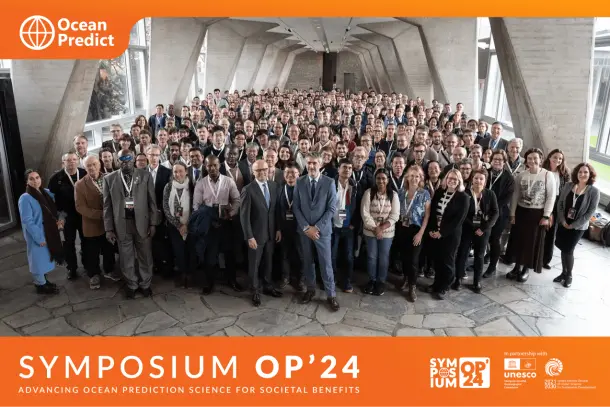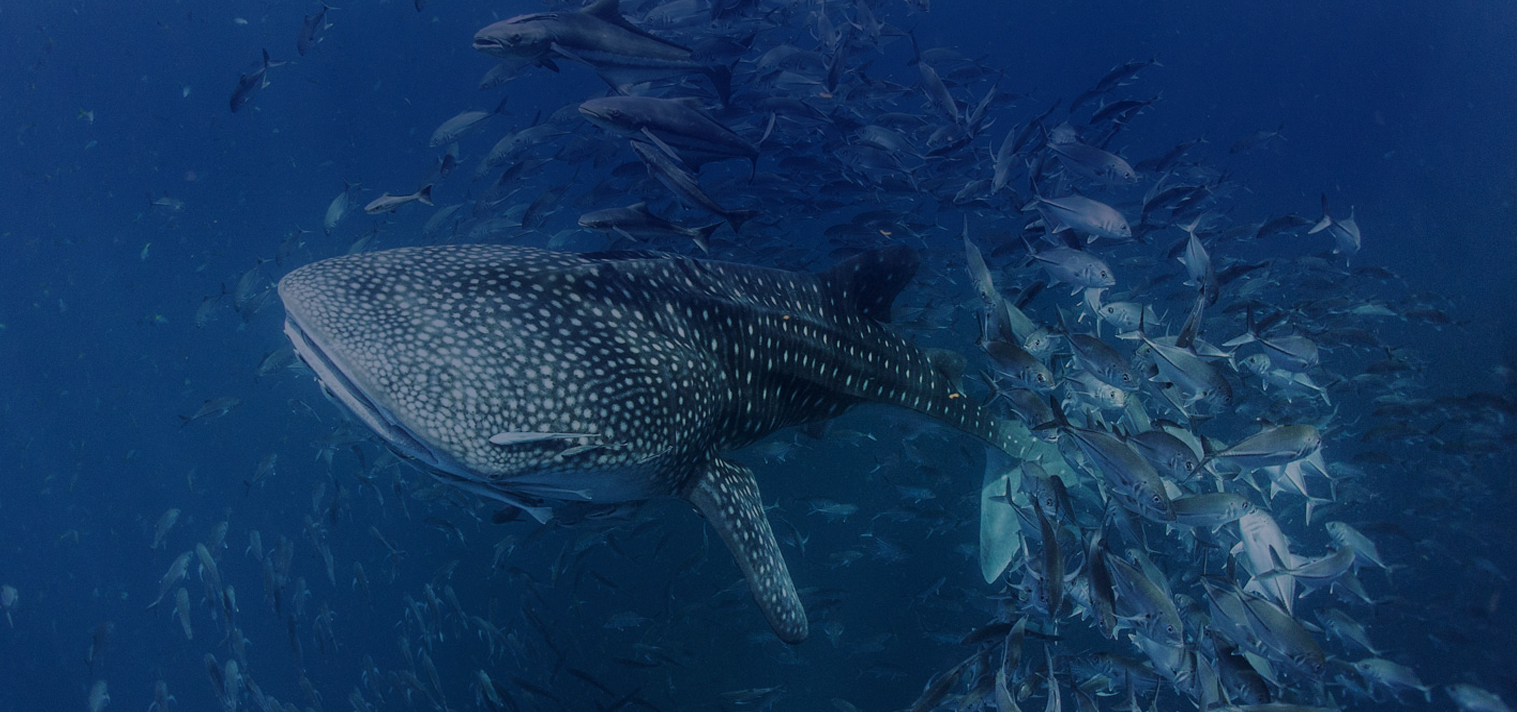OceanPredict 2024 Symposium concludes: A major milestone in global ocean prediction and international cooperation
The OceanPredict 2024 Symposium, organized by the OceanPredict/ForeSea programme in collaboration with UNESCO’s Intergovernmental Oceanographic Commission (UNESCO-IOC), and co-sponsored by Mercator Ocean International and other international partners, has successfully concluded.

Held from November 18-22 at UNESCO headquarters in Paris, the event marked a significant milestone in global ocean prediction science. It brought together 350 on-site participants and attracted 1,500 online registrations from around the world, highlighting its importance within the UN Decade of Ocean Science for Sustainable Development 2021-2030 (‘Ocean Decade’).
Key outcomes of the symposium:
- Over 300 contributions (orals and posters), fostering high-quality exchanges between leading ocean and atmospheric scientists, service providers, industry representatives, and users of Ocean data.
- Addressing Critical Ocean Prediction Challenges
Experts focused on essential areas including coastal and regional ocean prediction, polar ocean and sea ice dynamics, and bridging global with regional scale predictions. Coastal regions face unique challenges due to complex interactions among currents, waves, and sediment transport. This complexity requires sustained observation networks and innovative approaches like multiscale modelling to improve accuracy. Ensemble forecasting has become crucial for improving prediction accuracy and providing actionable uncertainty information. New satellite data, such as SWOT observations of ocean circulation and improved sea ice thickness measurements, are contributing to more precise forecasts. However, in situ observations remain fundamental to ocean prediction, with ongoing challenges in expanding measurements to deeper ocean and biogeochemistry. - AI and Digital Twins: game-changers for Ocean prediction data
Artifical Intelligence (AI) techniques are rapidly advancing ocean prediction capabilities across multiple domains. These innovations range from more accurate modelling with reduced computational costs to better estimates of previously unobserved ocean areas and parameters. Machine learning models are set to improve probabilistic forecasting and enable fast, multi-resolution mapping of ocean conditions. Additionally, digital ocean twins are emerging as transformative technologies that promote collaboration and broaden access to ocean prediction tools. - Societal Benefits and Policy Implications
The symposium highlighted the role of ocean prediction in informing policy decisions with actionable scientific insights that support sustainable management. For example, there is a pressing need for new standards in marine heatwaves forecasting and monitoring of their impacts on ocean ecosystems. Emerging initiatives on marine carbon dioxide removal also highlight the necessity for robust ocean monitoring systems to effectively confirm greenhouse gas emissions mitigation. - Enhanced International Collaboration
The event underscored the importance of structured international collaborations to align science, services, governance, and innovation. The Ocean Decade presents a unique opportunity to establish a framework that advances a sustainable global observing system for the blue, white and green ocean, while enhancing access to ocean prediction data.
Marie Drévillon, co-chair of OceanPredict’s science team and Head of Operations and Monitoring at Mercator Ocean, explained, “This event occurs every five years and is a very important gathering for ocean prediction scientists. It is one of the few international forums where we can discuss advancements in predicting ocean circulation, sea ice dynamics, or ecosystem variables. The collaborative environment fosters innovative ideas and partnerships that are essential for addressing the complex challenges facing our oceans.”
Pierre Bahurel, Director General of Mercator Ocean International, stated, “This symposium showcased how advancements in ocean prediction deliver real benefits to communities and strengthen our capacity for international efforts. Disposing of cutting-edge science and digital services for the ocean is crucial, and as Mercator Ocean International transitions to an Intergovernmental Organization (IGO) to reinforce its governance and capacity for action, appreciating the strong and continuously renewed links with the scientific community is more than ever essential. By fostering partnerships among scientists, policymakers, and industry leaders, we can enhance global ocean prediction and digital systems and improve our ability to understand and protect our oceans effectively.”
The OceanPrediction Decade Collaborative Centre (DCC) will play a crucial role in linking various initiatives within the Ocean Decade while enhancing connections between international experts to deliver cohesive forecasting information that meets societal needs. Future collaborations with bodies like GEO Blue Planet will be essential for developing tailored Ocean prediction capabilities.
“The OceanPredict 2024 Symposium exemplifies the transformative spirit of the Ocean Decade. By fostering collaboration and innovation in ocean prediction, we are equipping society with the data and knowledge needed to address the challenges of today and build the sustainable ocean of tomorrow,” said Vidar Helgesen, Executive Secretary of UNESCO-IOC.
Moving toward a future of open and accessible ocean information, it is vital to mobilize efforts across the entire ocean information value chain. The upcoming UN Ocean Conference (UNOC), in June 2025 in Nice, will serve as a platform to promote this call to action using the outcomes of the OP’24 symposium. Together, these collective efforts will help protect our oceans and support resilient coastal communities facing climate change, ultimately contributing to a sustainable future for all.
This press release was originally written by Mercator Ocean International, in partnership with UNESCO-IOC and the Ocean Decade.
***
About Mercator Ocean International: Mercator Ocean International (MOi) is a non-profit organization (in the process of transforming into an intergovernmental organization) committed to building a science-based digital Ocean to support the conservation and sustainable use of the Ocean. MOi provides an operational digital description of marine environments worldwide and assists international organisations in implementing community and institutional programs, projects, and initiatives. MOi continually fosters interactions between scientists, policymakers, public and institutional decision-makers, and civil society. Led by Director General Pierre Bahurel, MOi is based in Toulouse and has over 100 employees.
About UNESCO-IOC: The Intergovernmental Oceanographic Commission of UNESCO (UNESCO-IOC) promotes international cooperation in marine sciences to improve management of the ocean, coasts and marine resources. The IOC enables its 150 Member States to work together by coordinating programmes in capacity development, ocean observations and services, ocean science and tsunami warning. The work of the IOC contributes to the mission of UNESCO to promote the advancement of science and its applications to develop knowledge and capacity, key to economic and social progress, the basis of peace and sustainable development.
About the Ocean Decade: Proclaimed in 2017 by the United Nations General Assembly, the UN Decade of Ocean Science for Sustainable Development (2021-2030) (‘the Ocean Decade’) seeks to stimulate ocean science and knowledge generation to reverse the decline of the state of the ocean system and catalyse new opportunities for sustainable development of this massive marine ecosystem. The vision of the Ocean Decade is ‘the science we need for the ocean we want’. The Ocean Decade provides a convening framework for scientists and stakeholders from diverse sectors to develop the scientific knowledge and the partnerships needed to accelerate and harness advances in ocean science to achieve a better understanding of the ocean system and deliver science-based solutions to achieve the 2030 Agenda. The UN General Assembly mandated UNESCO’s Intergovernmental Oceanographic Commission (IOC) to coordinate the preparations and implementation of the Decade.




